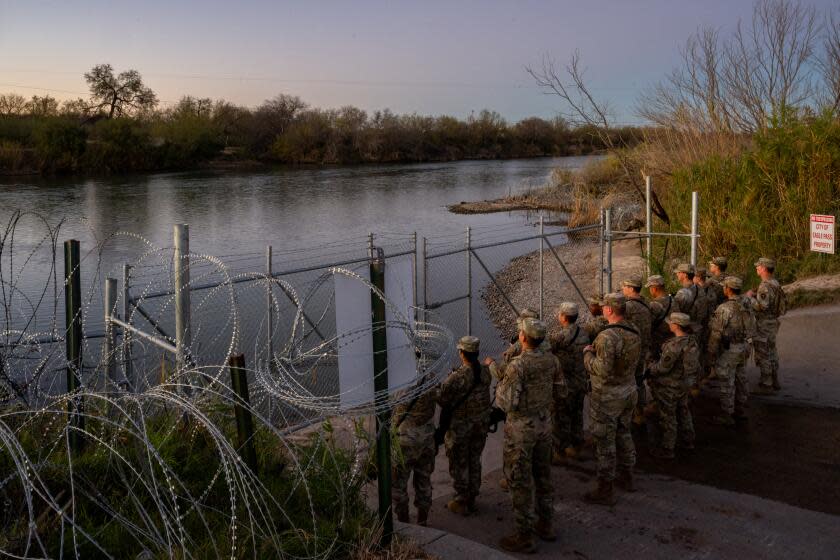Editorial: Do Republicans want to secure the border — or help Trump's presidential campaign?

- Oops!Something went wrong.Please try again later.
- Oops!Something went wrong.Please try again later.
For months, with the encouragement of the Biden administration, a bipartisan group of senators has been hammering out a compromise on new border security measures as part of a $110-billion supplemental spending bill that would also include aid for Ukraine in its defense against Russian aggression.
Yet even before the agreement is unveiled, that great disrupter Donald Trump has denounced it, thundering, “I’d rather have no bill than a bad bill.” Speaker Mike Johnson, whose Republican House majority functions as an adjunct of Trump’s presidential campaign, has suggested that if rumors about the measure are true, it is “dead on arrival” in that chamber.
Read more: Editorial: Trump's nomination is becoming a horrible inevitability. Why can't the GOP do better?
Trump’s attempt to sabotage the agreement even as it is still being negotiated suggests that he cares less about border security — a cause he has trumpeted in often ugly terms — than about being able to hammer President Biden on the issue on the campaign trail — if, as seems sadly likely, Trump wins the Republican presidential nomination. Trump seemed to acknowledge as much when he said last week in a statement that a border deal now “would be another Gift to the Radical Left Democrats.”
To their credit, senators involved in the negotiation are persevering in spite of Trump’s meddling, and an agreement appears imminent. On Sunday, Sen. James Lankford of Oklahoma, the lead Republican negotiator, defended the legislation, suggesting that some of his Republican colleagues misunderstand what it would do. For his part, Biden has said that the bill under discussion would be “the toughest and fairest set of reforms to secure the border we’ve ever had in our country."
Read more: Granderson: Texans don't hate migrants. Why do they elect such a cruel governor?
Until the compromise is finalized and made public, it’s difficult to evaluate whether it would go too far in restricting immigration — as a bill passed last year by the Republican-controlled House would. Reportedly, senators have been discussing tightening the standards for the “credible fear” of persecution or torture used in initial interviews with migrants requesting asylum.
Apparently, the bill as it has evolved would not include drastic restrictions on the president’s ability to admit migrants under his humanitarian parole authority.
Biden also said that the emerging legislation would give him “new emergency authority to shut down the border when it becomes overwhelmed.” (Johnson countered that Biden could shut down the border without legislation.) And the president reiterated his request for Congress to fund additional border patrol agents, immigration judges and asylum officers.
Read more: Editorial: House Republicans' border security bill misses chance to fix real immigration challenges
Important as securing the border might be, it shouldn’t be a prerequisite for an urgent infusion of military aid for Ukraine. But Biden invited such a linkage last year when he proposed an increase in funding for border security in connection with his request for assistance for Ukraine, Israel and Taiwan.
Although attention to Ukraine's fight to defend itself has waned in recent months, ongoing U.S. support sends the important message that Russian aggression elsewhere will not be tolerated. On Monday, Secretary of State Antony Blinken warned that without supplemental U.S. funding "everything that Ukrainians achieved and that we've helped them achieve will be in jeopardy."
For now, at least, assistance for Ukraine depends on progress on border security. Senators who are pursuing a reasonable compromise on that issue are right to stand strong, despite resistance by Trump and his enablers in the House.
This story originally appeared in Los Angeles Times.

